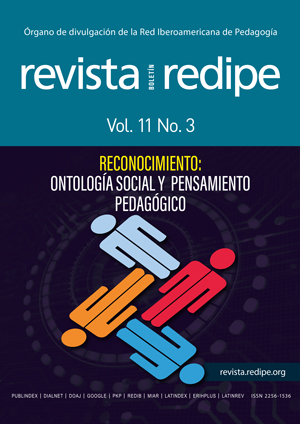Ser director escolar en dos sistemas educativos Europeo. Algunos resultados de una entrevista
##plugins.themes.bootstrap3.article.main##
Keywords
Líder escolar, Entrevista, España, Italia
Resumen
Los aspectos particulares que parecen caracterizar las actividades de los directores son la asunción de responsabilidades, las relaciones interpersonales así como la fragmentación de las acciones cotidianas. El propósito de este artículo es resaltar cómo, a pesar de las características comunes, las actividades se desarrollan de manera diferente en dos centros educativos europeos. contextos: España e Italia. Se entrevistó a seis líderes escolares durante un estudio de caso para investigar algunos aspectos relacionados con su papel y el contexto educativo en el que operan. Los resultados muestran que, aunque ambos sistemas están centralizados y otorgan poca autonomía, hay marcada diferencias en los métodos de selección de un director escolar y en sus respectivas carreras. La conclusión reflexiona sobre la diferente organización de la actividad docente, que, en parte, está condicionada por las considerables diferencias en el tamaño del instituto.
Referencias
The Leadership Quarterly, Vol. 6, Issue 2, 199- 218.
Bass, B. M. and Stogdill, R. M. (1990). Handbook of Leadership. Theory, research and management applications. New York, The Free Press.
Bossert, S. T., Dwyer, D. C., Rowan, B. and Lee, G. V. (1982). The instructional management role of the principal. Educational Administration Quarterly, 18(3), 34-64.
Burns, J. M. (1978). Leadership. New York, Harper & Row.
Ciclo de conferencias. (R)evolución Educativa. Liderazgo de los equipos directivos. Obra Social la “Caiaxa”.
D.D.G. 22/11/2004. Corso concorso selettivo diformazione per il reclutamento dei dirigenti scolastici per la scuola primaria e secondaria di primo grado e per la scuola secondaria superiore e per gli istituti educativi. https://archivio. pubblica.istruzione.it/normativa/ 2004/allegati/bando_dirigenti_2004.pdf
D.D.G. 13/07/2011. Concorso per esami e titoli per il reclutamento di dirigenti scolastici per la scuola primaria, secondaria di primo grado, secondaria di secondo grado e per gli istituti educativi. http://www.flcgil.it/files/pdf/20110715/ bando-di-concorso-ordinario-dirigenti- scolastici.pdf
D.D.G. 23/11/2017. Corso-concorso nazionale, per titoli ed esami, finalizzato al reclutamento di dirigenti scolastici presso le istituzioni scolastiche statali. https://www.gazzettaufficiale. it/do/gazzetta/concorsi/0/ pdfPaginato?dataPubblicazione Gazzetta=20171124&numeroGazzetta= 90&tipoSerie=S4&tipoSupplemento= GU&numeroSupplemento= 0&numPagina=10&edizione= 0&elenco30giorni=true
Edmonds, R. (1979). Effective schools for the urban poor. Educational Leadership, 37,15–24.
Gronn, P. (2002). Distributed leadership as a unit of analysis. The Leadership Quarterly, 13, 423-451.
Hallinger, P. (2005). Instructional leadership and the school principal: A passing fancy that refuses to fade away. Leadership and Policy in Schools, 4(3), 221-239.
Heck, R. H. (1992). Principals’ instructional leadership and school performance: Implications for policy development. Educational Evaluation and Policy Analysis, 14(1), 21-34.
Heck, R. H. (2000). Examining the impact of school quality on school outcomes and improvement: A value-added approach. Educational Administration Quarterly, 36(4), 513-552.
Heck, R. H., Larsen, T. J. and Marcoulides, G. A. (1990). Instructional leadership and school achievement: Validation of a causal model. Educational Administration Quarterly, 26(2), 94-125
Heck, R. H., Marcoulides, G. A. and Lang, P. (1991). Principal instructional leadership and school achievement: The application of discriminant techniques. School Effectiveness and School Improvement, 2(2), 115-135.
Heck, R. H. and Marcoulides, G. A. (1996). School culture and performance: Testing the invariance of an organizational model. School Effectiveness and School Improvement, 7(1), 76-95.
Krüger, M. and Scheerens, J. (2012). Conceptual Perspectives on School Leadership in School Leadership Effects Revisited: Review and Meta-Analysis of Empirical Studies (pp 1-30).
Leithwood, K., Day, C., Sammons, P., Harris, A. and Hopkins, D. (2006). Seven strong claims about successful school leadership. Nottingham, UK, National College of School Leadership.
Marks, H. M. and Printy, S. M. (2003). Principal leadership and school performance: An integration of transformational and instructional leadership. Educational Administration Quarterly, 39(3), 370- 397.
Ministerio de Educación y Formación Profesional de España https://www.educacionyfp. gob.es/portada.html
Murillo, F. J. (2006). Dirección escolar para el cambio: del liderazgo transformacional al liderazgo distribuido. REICE – Revista Iberoamericana sobre Calidad, Eficacia y cambio en Educación. Vol. 4, N°. 4e. pp.17.
Robinson, V. M. J., Lloyd, C. A. and Rowe, K. J. (2008). The Impact of Leadership on Student Outcomes: An Analysis of the Differential Effects of Leadership Types. Educational Administration Quarterly, Vol. 44, N°. 5.
Richmond, M. J. and Allison, D. J. (2003). Toward a Conceptual Framework for Leadership Inquiry. Educational Management & Administration, 31(1), 31-50.
Sergiovanni, T. J. (2000). Costruire comunità nelle scuole. LAS. Roma.
Spillane, J. P. (2006). Towards a theory of leadership practice: A distributed perspective. In Rethinking Schooling (pp. 208-242). Routledge.
Timperley, H. (2005). Distributed leadership: developing theory from practice. Journal of Curriculum Studies, 37(4), 395-420.



